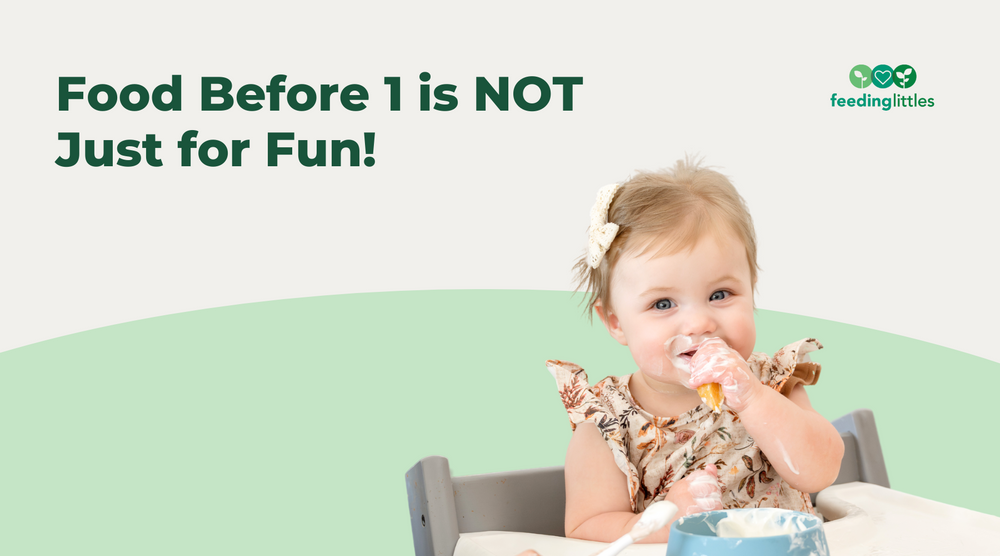
We hear the term “food before 1 is just for fun” thrown around in various Baby-led Weaning communities. The spirit of this phrase is great – don’t stress about the quantity of food your baby eats, and don’t worry if they just play – but the idea that EXPOSURE to food is unimportant before 1 could not be further from the truth for a variety of reasons. (This phrase is literally keeping some parents from offering any food before one.)
Yes, your baby's milk will make up the majority of their nutrition until age 1. Milk will provide them with adequate macronutrients (calories, protein, fat), most micronutrients (vitamins, minerals) and all of their hydration needs. However, exposure to food is so important for so many reasons as well.
Plus, learning to eat is a process. It doesn't happen overnight. It's important for babies to have lots of time to practice eating real food before we wean them from the breast or bottle, which oftentimes happens at 12 months for many families.
Why is it important to introduce foods around 6 months (and not wait until 1)?
Allergen exposure: we used to recommend delaying allergen exposure (like peanut butter or eggs), but now we know that offering allergenic foods when you start solid foods (around 6 months) can actually lower your baby's risk of an allergy. Our Infant Course details all top 9 allergens, how to introduce them and how to make sure you continue to incorporate them in your child's diet.
Nutrition: Iron is a critical nutrient for brain development, growth and transporting oxygen throughout your baby's body. They get iron in breast milk and formula. However, at 6 months of age their iron needs increase as the iron stored in their body begins to deplete. One of the main reasons we offer solid foods around 6 months is to make sure they're getting more iron than what is provided in breast milk or formula. No, babies don't need solid foods for overall calories, but they do need them for added iron. Tender meats, poultry, fish, lentils, nut/seed butter, leafy greens and whole grains are great iron sources for babies.
Picky eating prevention: Research suggests that babies who don’t get to practice with foods of various textures by 9 months have an increased risk of have feeding issues in elementary school. (Please don't let this scare you if your baby is struggling with foods - the point of talking about this is that exposure is important. If you're exposing your baby - even if they're not eating it just yet - you are doing your job!) If we don't give babies a chance to try different foods, in infancy, they can miss out on learning about and accepting new textures. Furthermore, babies might have a critical window of flavor acceptance in infancy. It's important to offer lots of different foods at a time when they might be more open-minded to them.
Oral-motor development: Chewing is a skill that takes time to master. When babies chew on food, they develop muscles and coordination in their mouth that is also important for speech. If we delay foods until age 1, babies miss out on critical chewing practice.
Sensory development: Eating is one of the best sensory experiences for babies! Think about it - they touch new textures and temperatures, taste new flavors, hear food squishing in their hand, see a range of colors and smell the aroma of what they're eating. To help babies integrate into our world, it's important to expose them to different sensory inputs. By giving them food when they turn 6 months, you are checking that sensory play box, big time!
Social experience and language: Mealtime offers so many opportunities to interact with your baby. They observe how you sit and act at the dinner table, listen to you talk and eventually model your behaviors. Being part of family mealtime is critical for kids' social, emotional and speech development.
Babies are interested in food around 6 months (or even sooner!): One important readiness cue for solid foods is your baby showing an interest in solid foods. They are biologically hard-wired to want to eat, as you might notice when your baby stares at you at the table or grabs for your snack. When we don't give them solids until 1, we risk missing a critical window of interest
For so many important reasons - allergies, nutrition, picky eating prevention, oral-motor and sensory development, social experience, language and honoring baby's interest - we strongly recommend introducing foods to your baby when they’re around 6 months and start showing readiness signs.
Side note: having a pincer grasp is not a sign of readiness for food, and gagging when they start is normal and protective! Babies need practice to learn how to eat! Check our blog post for more feeding myths! Need help feeding your baby? Join the hundreds of thousands of families who have used our online Infant Course to feel confident in this process!
